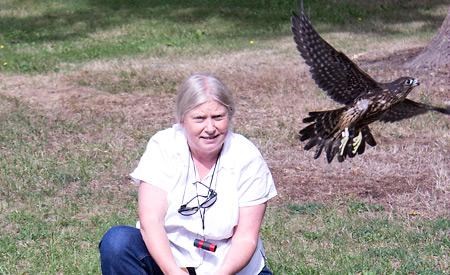It was a homecoming for three merlin falcons whose lives took a slight detour after taking a tumble from their nest near Myrtle Creek this summer. After spending two months at a bird rehabilitation facility in Delta, the siblings were returned home to be released September 17. Bob Brooks and Holly Roy found two of the three birds in their front yard in the middle of July. “It was later in the afternoon and I was just walking along by the trees and I heard this squeaky noise coming from the bushes,” said Roy. “I pulled apart the shrubbery and saw these two little fluff balls huddled inside an open stump.” Roy said she thought the babies might have been pushed out of the nest by crows or other birds. The merlins were about three weeks old when they were found, she estimates. “They didn’t have their proper feathers, just their down.” Despite their cute appearance with round bulgy eyes, the birds had sharp talons and voracious appetites. Brooks and Roy knew that the birds’ parents were still around because they had been watching them all summer and guessed that the babies they found were from the merlins’ nest. Their initial reaction was to call a bird rescue society in Courtenay and consult with them what to do. Roy was told that the merlin parents would continue to feed the babies, who were only weeks old and could not yet fly. “They wouldn’t have survived like that on the ground though with the raccoons, dogs and bears—even with the parents taking care of them,” said Roy. When Roy checked on the birds, she found the parents had left a dead mouse for their babies to eat. In Powell River, when wild birds are in need of rescue, people are directed to contact Merrilee Prior. “If you call the [Powell River] SPCA, [it] will tell you to call the bird lady,” said Prior who works to save all species of wild birds, no matter if they are endangered or not. Merlin falcons on the Sunshine Coast are, as Prior put it, “common as dirt,” and not endangered. Their diet consists of mostly small birds, but they will also eat mice and voles. Fully grown they can be as large as 30 centimetres tall, weigh 230 grams, roughly the weight of four Mars bars, and have a wingspan of 64 centimetres. The variety of falcons can be found in a variety of habitats which include open coniferous woodland, farmland, suburbs, marshes, estuaries and seacoasts. Prior said the merlin population in Westview keeps the grey squirrel population in check. “They’re snacking on big things,” she said, adding that she once witnessed merlins consume an adult pigeon, which is roughly the same sized bird as they are. When they were done, only one of the pigeon’s feet was left. She sends birds to the BC SPCA Wild Animal Rehabilitation Centre (ARC) in Victoria or the Orphaned Wildlife Rehabilitation Society (OWL) in Delta. Prior suggested the merlins be sent to OWL which “has a huge bird area—about the size of football field—so they get strong and fly well,” she said. After the two birds were removed, Roy noticed the parents became visibly distressed. They stayed around the property for three or four days then vanished, she said. “I guess they were heartbroken. That was very sad.” Elaine Nash works at Pebble Beach Farm, Brooks and Roy’s neighbour on the other side of Myrtle Creek. Some out-of-town construction workers on the property heard a bird and alerted Nash who found the third merlin in the tall grass next to the creek. “Every time it saw me, it opened its beak,” said Nash. “It was probably hopeful that I give him something to eat.” Nash took the bird to Dr. Brian Barnes at Westview Veterinary Hospital, but instead of leaving the farm’s address for her contact information she left her own home address. As all three birds were sent by helicopter to OWL, the fact they were siblings was unknown. They were raised by foster parent merlins that are kept at the sanctuary. “OWL is great that way,” said Prior. “They have birds that can’t be released, so they get permits to keep them and use them as foster parents.” While in care, the birds have extremely limited exposure to human beings, added Prior, perhaps seeing a person slip into their area to deliver food and quickly leave. “The baby merlins were raised by merlins to be merlins,” she said. “They won’t come back to us looking for food.” Prior realized the three merlins were siblings only when they returned home from the sanctuary. On September 17, she picked the birds up at the airport after they had taken, like so many Powell Riverites, a Pacific Coastal Airlines flight home from the Lower Mainland. Prior delivered the birds to Brooks and Roy’s home to be released near the fir tree where they were hatched. “Now I want to tell [their parents] to come back and find their babies, but I don’t know where the parents have gone,” said Roy, adding that she was pleased to see the youngsters flying around her yard. For Prior, the most satisfying part of caring for sick and injured birds is the day she can release them. “It’s always fun to let them go,” said Prior. “That’s the best part.”



